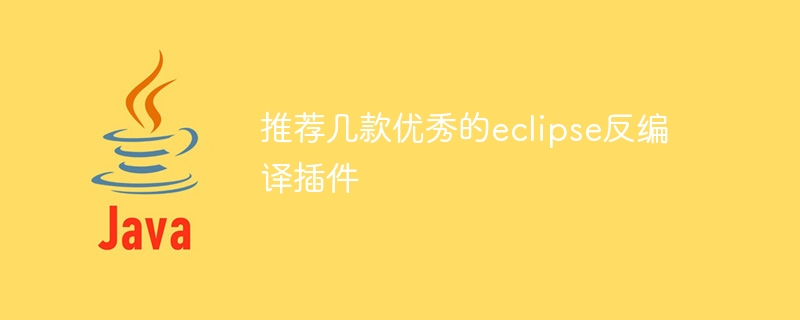Recommend several excellent Eclipse plug-ins for decompilation

Title: Recommend several excellent eclipse decompilation plug-ins, with specific code examples
Text:
Eclipse is widely used in Java The developed integrated development environment (IDE) provides a wealth of plug-ins. Among them, the decompilation plug-in is a very important and commonly used tool for converting Java bytecode into readable Java source code. During the development process, we often encounter situations where we need to view the source code of third-party libraries or open source frameworks. At this time, a useful decompilation plug-in will greatly improve our efficiency. The following are recommendations for several excellent Eclipse decompilation plug-ins, along with some specific code examples.
- JadClipse
JadClipse is a highly respected Eclipse decompilation plug-in. It is based on the Jad decompiler and can convert Java's .class files into equivalent Java source code. JadClipse is relatively simple to use, requiring only simple installation and configuration to get started.
The specific code examples are as follows:
public class ExampleClass {
public static void main(String[] args) {
System.out.println("Hello, World!");
}
}After using the JadClipse plug-in, the .class file of the above code snippet can be converted into the following Java source code:
public class ExampleClass {
public static void main(String[] var0) {
System.out.println("Hello, World!");
}
}- JD-Eclipse
JD-Eclipse is another popular Eclipse decompilation plug-in, which is based on the JD-Core decompiler. JD-Eclipse has a powerful decompilation function that can more accurately restore bytecode to the original Java source code.
The specific code examples are as follows:
public class ExampleClass {
public static void main(String[] args) {
System.out.println("Hello, World!");
}
}After using the JD-Eclipse plug-in, the .class file of the above code snippet can be decompiled into the following Java source code:
public class ExampleClass {
public static void main(String[] args) {
System.out.println("Hello, World!");
}
}- CFR
CFR is a powerful open source decompilation tool that also provides an Eclipse plug-in. The CFR plug-in can decompile in a highly readable manner and provide more accurate restoration results for complex codes.
The specific code examples are as follows:
public class ExampleClass {
public static void main(String[] args) {
System.out.println("Hello, World!");
}
}After using the CFR plug-in, the .class file of the above code snippet can be decompiled into the following Java source code:
public class ExampleClass {
public static void main(String[] var0) {
System.out.println("Hello, World!");
}
}The above are recommendations for several excellent Eclipse decompilation plug-ins, with some specific code examples attached. By using these plug-ins, we can easily obtain the source code of third-party libraries or open source frameworks and improve our development efficiency. At the same time, these plug-ins also provide convenience for learning and analyzing other people's code, helping us better understand and apply Java development technology.
The above is the detailed content of Recommend several excellent Eclipse plug-ins for decompilation. For more information, please follow other related articles on the PHP Chinese website!

Hot AI Tools

Undresser.AI Undress
AI-powered app for creating realistic nude photos

AI Clothes Remover
Online AI tool for removing clothes from photos.

Undress AI Tool
Undress images for free

Clothoff.io
AI clothes remover

AI Hentai Generator
Generate AI Hentai for free.

Hot Article

Hot Tools

Notepad++7.3.1
Easy-to-use and free code editor

SublimeText3 Chinese version
Chinese version, very easy to use

Zend Studio 13.0.1
Powerful PHP integrated development environment

Dreamweaver CS6
Visual web development tools

SublimeText3 Mac version
God-level code editing software (SublimeText3)

Hot Topics
 1378
1378
 52
52
 How does Java's classloading mechanism work, including different classloaders and their delegation models?
Mar 17, 2025 pm 05:35 PM
How does Java's classloading mechanism work, including different classloaders and their delegation models?
Mar 17, 2025 pm 05:35 PM
Java's classloading involves loading, linking, and initializing classes using a hierarchical system with Bootstrap, Extension, and Application classloaders. The parent delegation model ensures core classes are loaded first, affecting custom class loa
 How do I implement multi-level caching in Java applications using libraries like Caffeine or Guava Cache?
Mar 17, 2025 pm 05:44 PM
How do I implement multi-level caching in Java applications using libraries like Caffeine or Guava Cache?
Mar 17, 2025 pm 05:44 PM
The article discusses implementing multi-level caching in Java using Caffeine and Guava Cache to enhance application performance. It covers setup, integration, and performance benefits, along with configuration and eviction policy management best pra
 How can I use JPA (Java Persistence API) for object-relational mapping with advanced features like caching and lazy loading?
Mar 17, 2025 pm 05:43 PM
How can I use JPA (Java Persistence API) for object-relational mapping with advanced features like caching and lazy loading?
Mar 17, 2025 pm 05:43 PM
The article discusses using JPA for object-relational mapping with advanced features like caching and lazy loading. It covers setup, entity mapping, and best practices for optimizing performance while highlighting potential pitfalls.[159 characters]
 How do I use Maven or Gradle for advanced Java project management, build automation, and dependency resolution?
Mar 17, 2025 pm 05:46 PM
How do I use Maven or Gradle for advanced Java project management, build automation, and dependency resolution?
Mar 17, 2025 pm 05:46 PM
The article discusses using Maven and Gradle for Java project management, build automation, and dependency resolution, comparing their approaches and optimization strategies.
 How do I create and use custom Java libraries (JAR files) with proper versioning and dependency management?
Mar 17, 2025 pm 05:45 PM
How do I create and use custom Java libraries (JAR files) with proper versioning and dependency management?
Mar 17, 2025 pm 05:45 PM
The article discusses creating and using custom Java libraries (JAR files) with proper versioning and dependency management, using tools like Maven and Gradle.




